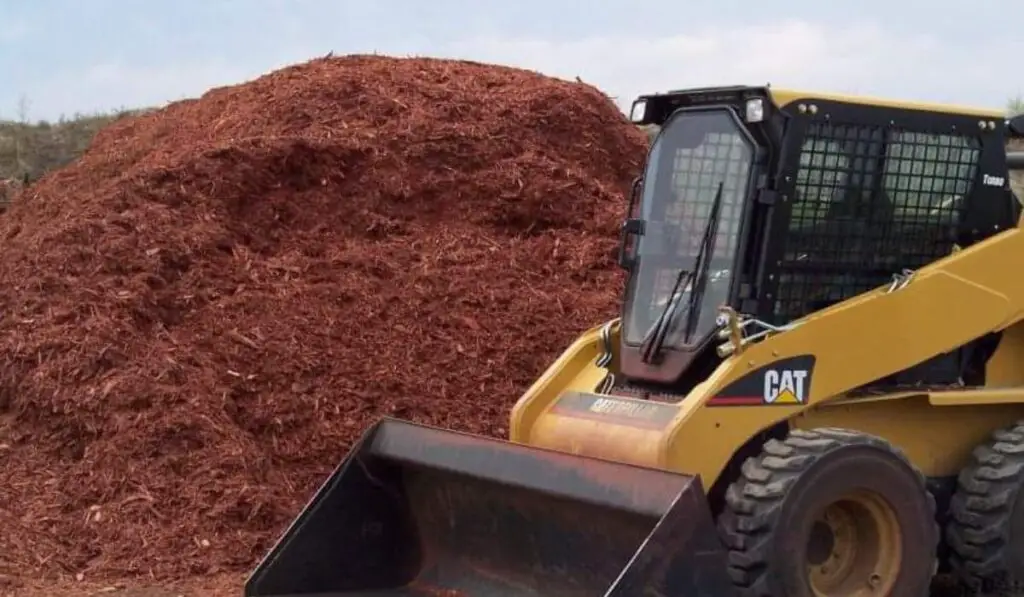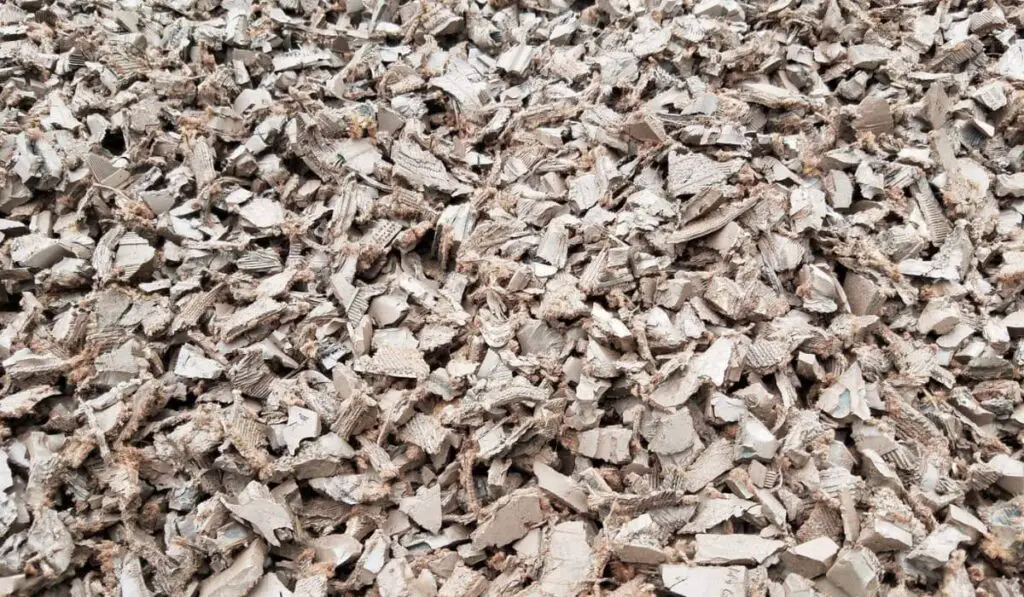Wood mulch has dominated the landscaping space for quite a long time. A few years back, rubber mulch was introduced into the market and received warm reception. As expected, either landscaping option would soon have devotees and critics.
One group considers wood mulch better since it’s natural and environmentally safe. On the other hand, rubber mulch enthusiasts swear by its longevity and contribution to preserving trees.
The most befitting option depends on various factors. You’ll want to follow through with this rubber mulch vs wood mulch guide to help you make an informed decision.
Contents
What Is Wood Mulch?
Wood mulch is simply fine chips of offcuts, barks, pallets or any other wood matter. It comes in different colors, and its constituency depends on the raw material used for production.
Unlike rubber mulch, wood mulch breaks down and nourishes the soil. Also, it’s readily available. You’re sure to find it in most timber yards and timber stores.
Wood Mulch Pros
- Wood mulch is biodegradable
- Suppresses the growth of weeds
- Lends a natural appearance to a garden or yard
- Installation doesn’t require a fabric landscape barrier
- Lighter than rubber mulch
- Lesser energy consumption during production
- Helps to conserve soil
Wood Mulch Cons
- Lightweight, therefore, easily blown around
- Requires replacing every one to two years since it washes away
- Decomposes quickly
- Susceptible to matting down which inhibits air and water flow

The common types of wood mulch are cedar mulch, cypress mulch, pine needles, and bark mulch.
Cedar Mulch
Cedar is one of the long-lasting mulch varieties. Cedar mulch is ideal for landscaping because it does not decompose as quickly as other wood mulch varieties. Homeowners don’t have to replace this ground cover frequently.
The best place for cedar mulch is in areas that go for extended periods without rainfall or where weeds are a problem. It can also be used in areas with heavy clay soil. However, heavy clay soils absorb moisture poorly, so this mulch may require replacing more often.
Cedar mulch generates pleasant odor, repels insects/bugs, and decomposes more slowly compared to other wood mulches. It doesn’t need frequent replacing. However, cedar mulch is relatively pricey.
Cypress Mulch
Cypress mulch is derived either from remains of Cyprus lumber or felled and ground Cyprus trees. This mulch has a naturally rough appearance, which makes it ideal for retaining moisture and fighting the spread of weeds.
Mulch from older Cypress trees is desired due to its termite and decay resistance. As Cypress matures, its heartwood becomes more resistant to rot and termites. Cypress mulch harvested from young trees lacks these properties.
Cypress mulch has coarser shreds, making it ideal for slopes. It’s also long-lasting. That said, the natural Cypress wood color might not appeal to some homeowners. Over-harvesting of Cypress trees for mulch is also a major concern. Cypress mulch may float away in heavy rain.
Pine Needles
Pine needles, also known as pine straws, can be collected and used as landscape mulch. You can also shred them into small pieces for use in landscaping. These needles can be used to add texture and color to your garden bed and deck. They are a great alternative to other wood mulch, which costs more.
Pine needle mulch is light and easy to spread, doesn’t compact, is long-lasting, and inexpensive. However, it increases the acidic content of the soil.
Shredded Hardwood
Shredded hardwood is one of the types of wood mulch suitable for gardens, flower beds, and trees. It does not require any additional soil amendments to be planted along with the soil.
There are many benefits of shredded hardwood mulch. It’s cheaper than other wood mulches, lasts longer, provides reasonable weed control, and retains soil moisture.
Shredded hardwood mulch doesn’t compact or degrade the soil. You can plant and easily propagate your bushes, flowers, and trees directly in the shredded hardwood mulch.
Bark Mulch
Bark mulch is created from the bark of different species, such as fir, pine, oak, or cedar. Bark mulch is made into an inch-thick layer around plants. The purpose of the bark mulch is to help keep the soil more acidic, retain moisture, and decompose odors.
Bark mulch has many benefits, making it an excellent choice to add to your landscaping needs. It helps reduce weeds and keeps your landscape aesthetically pleasing year-round. However, bark mulch has low nutritional value to the soil.
What Is Rubber Mulch?
Landscape rubber mulch refers to bits of rubber that are cut up and then dyed to mimic natural mulch. These ground covers are made from small chunks of rubber derived from recycled materials, most often tires. The pieces are dried and cut to create a look that is incredibly similar to other ground covers like wood mulch.
Compared to other landscaping covers, rubber mulch is affordable, lighter to transport, and more environmentally friendly. It’s a fantastic alternative to other covers because it continuously looks fresh and doesn’t decay.
Is Rubber Mulch Safe?
Rubber mulch is safe. It doesn’t pose significant threats to the environment, plants, pets, and humans. Rubber mulch comes from recycled materials, which reduce the odds of adversely affecting the surroundings. These mulches are certified playground materials, thus safe.
There have been some safety concerns about rubber mulch and its environmental effect. As rubber mulch breaks down, it leaches chemicals, especially those containing mineral elements like chromium, selenium, zinc, and aluminum.
Some claim these chemicals can interfere with your landscaping projects’ soil properties, including water retention. Some homeowners also allude rubber mulch produces polyaromatic hydrocarbons, which have detrimental effects on humans and the environment. However, nothing has so far been documented or scientifically proven.

Is Rubber Mulch Safe for Dogs?
Rubber mulch is safe for dogs. It’s made of metal-free recycled tires, making it safe for pets, including dogs. Rubber mulch won’t hurt your dog’s paws when playing or walking on it. This mulch doesn’t impact the dog’s health nor causes allergies.
Below are more reasons why rubber mulch is safe for dogs and pets.
- Rubber mulch is a landscaping ground cover with the highest shock absorption rate. This can help your dog prevent injuries when they stumble or fall while playing and running on it.
- This mulch variant is safe for dogs because it reduces the continuous joint impacts they can suffer when falling and tumbling.
- Rubber mulch contains a non-porous nature that makes it non-conducive for various organisms such as bacteria and fungi. This way, it will keep your dog away from the effects of different microorganisms.
How To Use Rubber Mulch for Landscaping
Rubber mulch is appropriate for both commercial and residential uses. It’s a great option because of its aesthetic looks and commercial-grade durability.To use it for landscaping, you can lay and spread it on side yards, walkways, and in the lines of the edges of your house.
You can also lay rubber mulch on commercial parking lots or garden beds. Feel free to install it on buffer zones and islands.Ensure you wear hand gloves before installing rubber mulch. After wearing gloves, cut open the top of the mulch bag and spread the rubber mulch across your yard.
Finally, use your hands to blend the rubber bits with the surrounding. The trick is to avoid lumping rubber mulch on a single section of your lawn.
Rubber mulch pros
- Durable
- Easy to maintain
- Ability to suppress weeds
- Available in different colors and shapes
- Promotes different artistic preferences
- Doesn’t absorb water
- Easy to install
- Less messy than wood mulch
- Protects the soil from elements
- Doesn’t attract pests and insects like termites
- Easy to maintain
Rubber mulch cons
- Low-grade mulch can have traces of harmful artificial chemicals
- Pricier than wood mulch
- Highly flammable
- Fabric landscape barrier required during installation
- Has a characteristic rubber odor
- Doesn’t enrich the soil with vital nutrients
Rubber Mulch vs Wood Mulch: A Detailed Comparison
Wood mulch and rubber mulch comprise different features. Aligning your tastes and preferences with these qualities can really help you choose the best mulch for your garden or yard. Here’s what to expect:
Appearance
When comparing rubber mulch vs wood mulch it’s prudent to compare their appearances. If you want a natural appearance, wood mulch will serve you better. Also, it doesn’t fade; therefore lends your space an everlasting organic look.
It’s easy to mistake rubber mulch with wood mulch since it looks like wood chips. However, it’s not as natural-looking as wood mulch. Quality rubber mulch doesn’t fade.
Cost
You’ll part with $30 to $110 for one cubic yard of wood mulch and $80 to $160 for a cubic yard of rubber mulch. Rightly so, wood mulch is cheaper than rubber mulch. Nonetheless, the total cost depends on various factors, including:
- The surface area requiring mulch
- Depth of mulch
- Quality of the mulch (high-end mulches are costlier)
- Installation costs which can be $20 to $45 per cubic yard
- Transportation costs
Health and Safety
Wood and rubber mulches are meant for your immediate surroundings, meaning people and pets will interact with them. Therefore, knowing what you’ll be getting from either option is crucial.
Wood mulch is safer than rubber mulch. Untreated wood mulch is the safest and healthiest option. It lacks harmful chemicals known to seep into the soil after mulch installation. Unlike wood mulch, rubber mulch can release harmful VOCs (Volatile Organic Compounds).
Maintenance
If you’re into easy-to-maintain mulch, rubber mulch will serve you best. Wood mulch can be blown around, so you must keep sweeping it back. Contrastingly, rubber is heavy. Therefore, it stays.
With rubber mulch, there’s no worrying about termite infestation, mold and fungi control. It gives you an easier time than wood mulch.
Final Thoughts
From this rubber mulch vs wood mulch comparison, it’s evident that the right one for you depends on the use case. For instance, wood mulch is recommended for vegetable gardens. Your personal preferences determine the best mulch for your landscaping needs.
If you prefer brighter colors, rubber mulch provides a wider range of options. However, wood mulch does a better job if all you want is a natural-looking space.